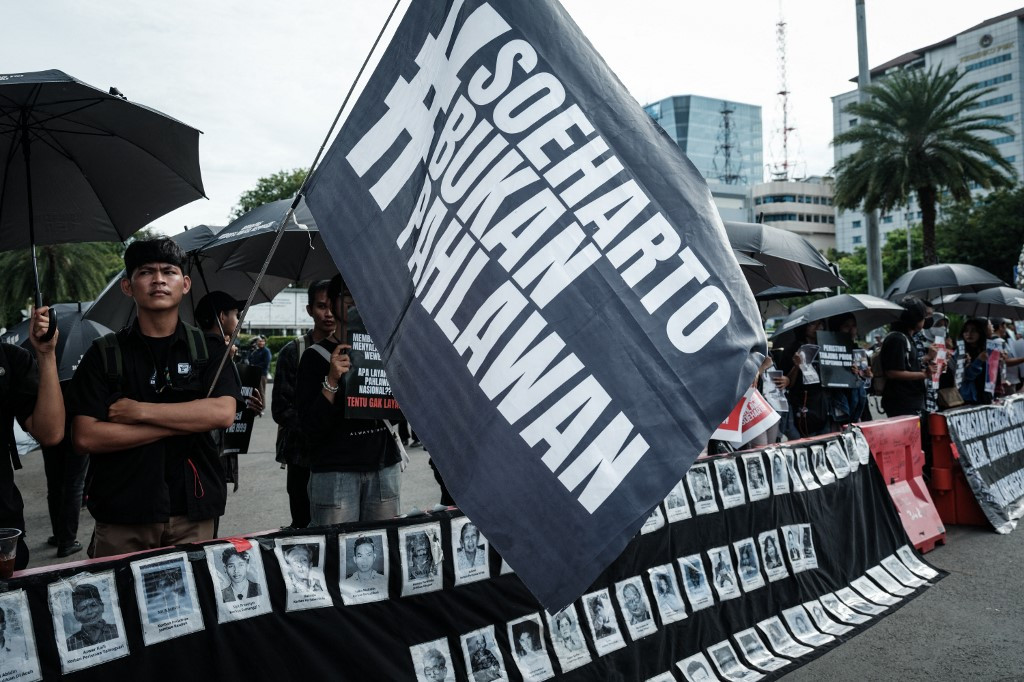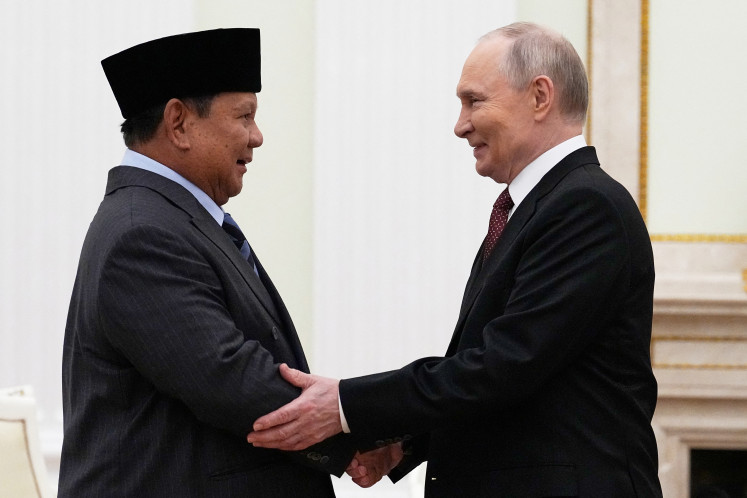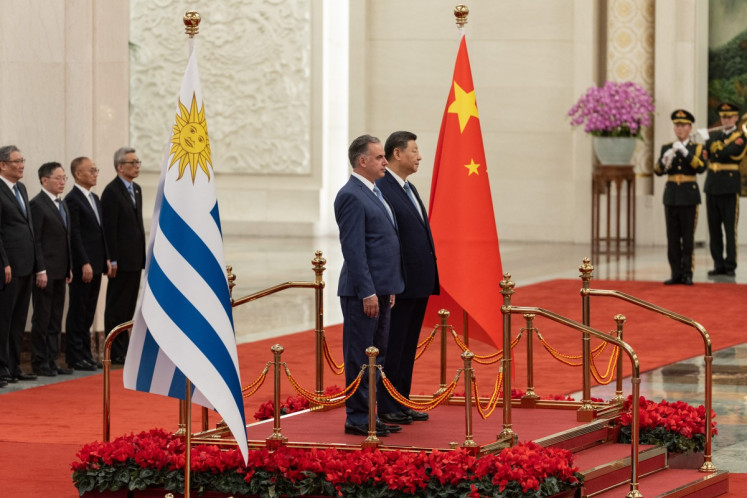Popular Reads
Top Results
Can't find what you're looking for?
View all search resultsPopular Reads
Top Results
Can't find what you're looking for?
View all search resultsDemocracy doesn’t need heroes
Democracy itself is anti-heroic. Progress does not come from the benevolence of a single messiah but from the collective operation of an impersonal system.
Change text size
Gift Premium Articles
to Anyone
T
his year’s list of national hero honorees has sparked controversy. Alongside popular figures such as former president and pluralism icon Abdurrahman “Gus Dur” Wahid and slain labor activist Marsinah, the name Soeharto appeared, a figure many believe is utterly unworthy of the title. During his 32 years in power, Soeharto committed what many regard as grave historical wrongs.
But beyond the immediate controversy, a deeper question arises: why does the state grant such titles at all? Do we, as a democratic nation, really need heroes?
According to Law No. 20/2009, the title of national hero can only be awarded posthumously to those who rendered great service to the nation. This includes both figures who fought colonialism and those who helped shape or defend independence. Officially, the purpose is noble: to honor their contributions and inspire a spirit of heroism and moral example.
Yet we should not take these formal justifications at face value. The state’s act of conferring hero status often carries one of two symbolic political agendas: legitimizing power or appropriating the past.
In the case of Soeharto, the intention is transparent. Granting him the title risks legitimizing his political record, repression, corruption, collusion, nepotism and the mass killings of those affiliated, or merely accused of being affiliated, with the Communist Party of Indonesia (PKI).
Once Soeharto’s actions as “the Smiling General” are symbolically sanctified, it becomes easier for present-day rulers to justify similar actions in the name of “saving the nation”, a phrase so vague it can mean anything the ruler wants it to mean.
This tendency is already visible in today’s political landscape: the repression of activists, the persistence of police brutality and impunity and the involvement of political cronies in mega-projects like the free nutritious meal program. These patterns are eerily reminiscent of the New Order era. And now, like Soeharto, the current regime's repressive tendencies can also be framed as heroic acts.
The politics of appropriation are also evident in the state’s decision to honor Gus Dur and Marsinah. By recognizing Gus Dur, the state appears to have fulfilled his ideals of humanity, justice, equality and freedom. Yet, in reality, religious minorities still struggle to build places of worship and sexual minorities continue to live without safe spaces.
Similarly, honoring Marsinah gives the impression that the state has enacted pro-worker policies. In truth, the omnibus Job Creation Law does the opposite. As the Indonesian Legal Aid Foundation (YLBHI) notes, it weakens labor protections by legalizing greater flexibility in employment relations, working hours and wages.
For those in power, it is far easier to award Marsinah or Gus Dur the title of hero than to realize the values they fought for. Through symbolic gestures, the state can project the illusion of moral achievement while avoiding substantive change. Tragic as it is, we celebrate this kind of illusion every year.
Despite its lack of tangible impact on political or social reform, the awarding of hero titles continues to be greeted with public enthusiasm. Why? Because Indonesians, particularly Javanese, inherit a cultural imagination steeped in the myth of heroism.
Javanese culture preserves the prophecy of Jayabaya, the 12th-century king of Kediri, who foretold the coming of the ratu adil (just king) who would bring peace and prosperity. Sindhunata, in his book Ratu Adil: Ramalan Jayabaya & Sejarah Perlawanan Wong Cilik (2024), observes that many grassroots uprisings, such as the Java War (1825–1830), the Geger Pulung (1885), the Kyai Kasan Mukmin rebellion (1904) and the Sarekat Islam movement (1913) were inspired by this myth.
Sindhunata identifies three key features of the ratu adil movements: they are prophetic, because they arise from prophecy; messianic, because they promise liberation from suffering; and millenarian, because they envision a new, blissful age free from hardship.
This myth, whether consciously or not, remains deeply embedded in Javanese political culture. Every presidential election, candidates try to cast themselves as the long-awaited ratu adil. But the just king never comes, and the poor remain poor.
Waiting for the ratu adil is like waiting for tomorrow: we believe it will come, but when tomorrow arrives, it is still just another day. In our lifetimes, “tomorrow” never truly arrives, and perhaps neither will the just king.
Even though Indonesians inherit this heroic imagination, democracy itself is anti-heroic. In a democracy, there are no saviors. Progress does not come from the benevolence of a single messiah but from the collective operation of an impersonal system.
Democracy is, at its core, a regime of the masses, a system that places power in the hands of the many. The Spanish philosopher José Ortega y Gasset (1883–1955) described such a system critically in The Revolt of the Masses, writing that “The mass crushes beneath it everything that is different, everything that is excellent, individual, qualified and select. Anybody who is not like everybody, who does not think like everybody, runs the risk of being eliminated.”
Ortega y Gasset’s political thought, sometimes called aristocratic liberalism, held that social freedom should be guided by an intellectual elite. But a democratic society must resist such elitism to avoid sliding into aristocracy.
Indeed, stories of popular resistance inspired by heroic or messianic narratives have always been led by cultural and intellectual elites. As such, even Sindhunata’s “history from below” is, in truth, a history written from the middle: the story of elites who wade into the suffering of the people, not the people’s own story.
Nearly nine centuries have passed since Jayabaya’s prophecy. It is time to stop dreaming that a just king will transform our lives. What Indonesia needs is neither a ratu adil nor a hero, but an impersonal, accountable system that ensures justice and welfare for all.
To borrow a line from L. Ali Khan, professor emeritus of law at Washburn University: “The notion of a single hero slaying the dragons is a good script for a children’s book; democracy needs no such fictional hero but uses councils, committees, parliaments, cabinets and similar team-based institutions to conduct statecraft.”
---
The writer is a philosophy lecturer at Gadjah Mada University and a post-graduate student at the School of Philosophy, Australia National University.











